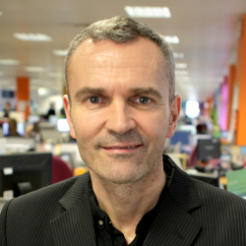Bodies like Acevo and NCVO have failed to provide proper leadership and lacked a concerted response in defending charities from public criticism, Oxfam's director of communications said this week.
Speaking at Civil Society Media’s NGO Insight conference on Wednesday, Jack Lundie said current sector initiatives to rebuild public trust are “toothless” in the absence of a concerted response from Acevo and NCVO.
“The absence of a concerted response is a little bit of an indictment of organised networks like Acevo and NCVO,” he said.
Lundie said current initiatives either “lack imagination or are incoherent in understanding where the audience are at”.
“We need real leadership from our chief executives - not just acting like they are talking shop, but to demonstrate sector-wide, less unilateral interest,” he said.
His comments came in response to a discussion about greater public scrutiny of charities – including the heightened risk or reputational damage.
Brendan Paddy, head of communications for the Disasters Emergency Committee said a lack of unified responses to reputational threats was “ultimately about leadership”.
“We’ve gone from everybody hiding under their desks - when things blow up and the one agency that is named is having to be dragged into the studio to respond - to some really good initiatives. There are at least three or four that I’m aware of and I hope some good practical things come of that.
“I think that sometimes people don’t respond because they don’t feel that they have the tools or support. They don’t want to be the only ones that are prepared to defend things like chief executive pay. But ultimately it’s about leadership, which is easy for me to say because I’m not the chief executive who has to go on the Today programme to explain how much I earn.
“But I think until we begin to normalise some of that and we aren’t seen to be running from it, we aren’t likely to be making very good progress.
Paddy said with issues like chief executive pay, the sector needed to make it clear it was “not ducking” from criticism, in order to get a “fair hearing”.
But he said is was also important when demonstrating the charity’s impact not to “just be showing a picture of a child with rice”. “We need to be able to demonstrate what we do,” he said.
He also urged charities to be transparent on the true costs of running a charity.
“One of the things you shouldn’t be doing is boasting about how low your overheads are,” he said. “You can’t run really good operations on a complete shoestring. We have again created a narrative of letting people think that charities are little momma and poppa bears which are run by volunteers and no one gets paid. That’s one of the reasons why people are appalled by what chief execs get paid - they don’t think people who work for charities get paid at all. And we’re colluding and maintaining that.
“We have to be honest about that. We have got much sharper and better at what we do but there are costs that come with that. We are very careful with that. We have done it very efficiently. We don’t waste it but you have to spend money to do the things we achieve,” he said.
Michael O’ Donnell, head of effectiveness and learning for Bond, said numbers are the easiest things for charities to talk about. Governance and effectiveness on the other hand are more difficult, he said.
“Climate change, conservation, peace, governance – you can’t say ‘I brought peace for 100,000 people this year’. It’s an entirely different way of working, in it’s complexity and its influence and contribution to change. We somehow need to get programmes to find out how to deal with this. We are dealing with a different world of development and the old methods of communication just aren’t going to cut it,” he said.
NCVO and Acevo response
Karl Wilding, director of public policy and volunteering at NCVO, said: "Trust in charities is a complex, shifting and multi-dimensional problem and no single message or action will ‘solve’ it – only a well-resourced and unified response stands any chance of success. This includes charities working to high standards and making sure they are seen to work to high standards.
"Along with CharityComms and Acevo, we’ve devoted significant time and resource to understanding what the public thinks about charities and why they think it, investing in focus group research to really get under the it and to find out what messages resonate.
"It’s vitally important that we’re able to make a positive statement about the difference our sector makes – again we’re taking our time to test and refine this and make sure it resonates with key audiences.
"In the meantime, we’ve been robust in our response to negative stories about charities. At one end of the scale we have provided swift comment and analysis – I did literally dozens of interviews about Kids Company, for example – and we’ve challenged stories as they emerge, going as far as to take matters to the press regulator when stories have fallen short of basic standards of accuracy."
Asheem Singh, incoming chief executive of Acevo, said: "I welcome this constructive criticism. Acevo has always striven to be first on the scene, and first on the airwaves as a robust advocate on behalf of the sector. But we are determined to do more to take our leaders with us.
"That means charity chief executives, senior leaders and trustees following the lead of organisations like Oxfam and being more prepared to stick their heads above the parapet.
"And it means Acevo helping lead the charge and being ever more creative and innovative in taking them with us. That’s where our next chapter – and that of the sector – begins."









